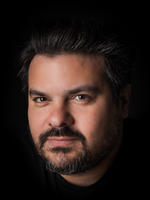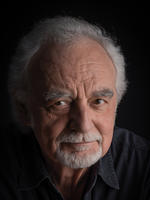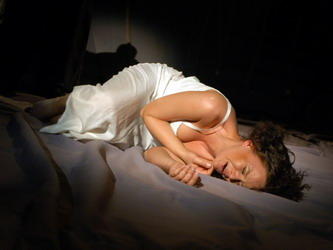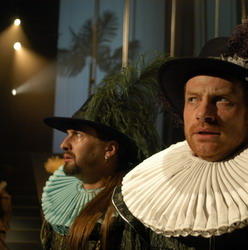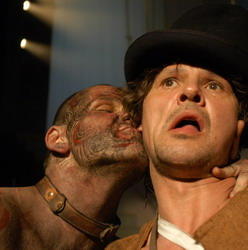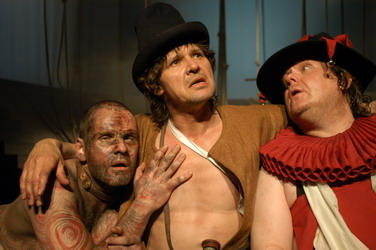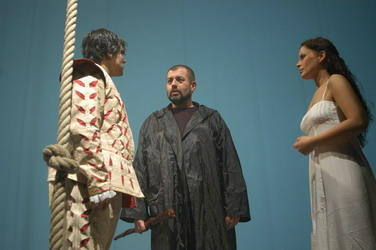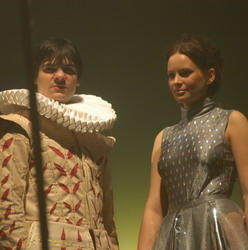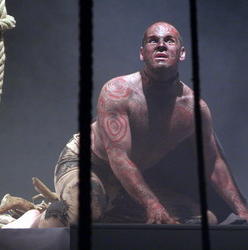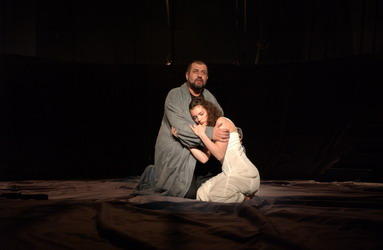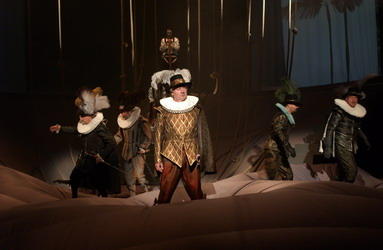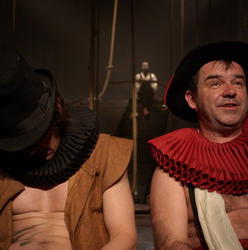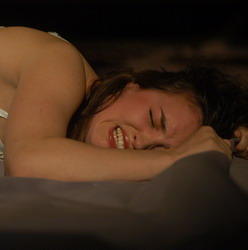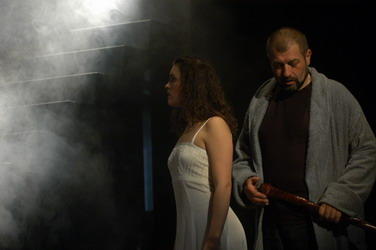Černín Painted the Tempest as a Picture of Revenge and Conciliation
Simona Polcarová 30. May 2005 zdroj Rovnost
A raging thunder is followed with lightening, a rare crew is floundering on a ship among ropes on a stormy sea. Prospero finishes his act of revenge and conciliation. The storm was not started only by him but also by director Zdeněk Černín in the first drama put on the New Scene of the Brno City Theatre. The premiere was held on Friday 27th May.
Černín (with dramatic advisers Viktor Kudělka and Ladislav Stýblo) managed to stuff Shakespeare’s patulous Tempest, where fates of once betrayed Prospero, his innocent daughter Miranda, subjugated Caliban, ghost Ariel performing magic, and a group of castaways headed by Prospero’s brother Alonso unwind on a desolated island, into two hours without any interval. As the title indicates it is first of all a play about betrayal and forgiveness, without neglecting fundamental dramatic moments.
It should be admitted that Černín bets on imagination in places where action falls behind. Prospero’s island really becomes a mystic place full of magic and fascinating visual phenomena in Černín’s concept, for example in Jan Dušek’s bewitching scene or in the play of lights and shadows. Billowy sails change into a sea, then in a restful island, the ship silhouette changes in a horizon, palms can be seen beyond. Ariel’s magic is accompanied with an impressive shadow play and dancing intermezzos (choreography by Libor Vaculík including movement presentation of lost paradise by absolutely naked actors, which will not be probably forgiven by critics).
From the dramatic point of view, only some characters get the opportunity to shine in Černín’s Tempest, others remain necessary but not extraordinary figures in a started game (Ferdinand acted by Alan Novotný). Zdeněk Junák, rather unusual but sufficiently convincing in a philosophical position, mastered gravely his Prospero, Trinculo and Stephan fully served to Erik Pardus and Martin Havelka as an inexhaustible repository of jokes, false demonstration of ostensible bravado and a pleiad of boozy faces. Enchanting Ariel acted by Lukáš Hejlík had inside silent sadness and a dose of mystery.
The Tempest in the Brno City Theatre has an undisputable value in the new translation by Jiří Josek whose verses are light, but do not lose their sufficient weight. Thanks to Josek, Shakespeare’s language remains contemporary, fresh and alive.
The Tempest – Shakespeare’s, Černín’s or Prospero’s?
Josef Meszáros 30. May 2005 zdroj Scena cz
Prospero: Try to live free too!
Audiences may definitely expect romanticism from the Tempest rehearsed by director Zdeněk Černín in the Brno City Theatre as an expurgatorial play full of magic presented on a parasidiac island on the stage. The intoxicating happiness shines and streams thanks to Jan Dušek’s stage setting, Libor Vaculík’s choreography and David Rotter’s music. If you come back to the original question whose is the Brno Tempest it should be completed that it could also be Josek’s Tempest. Translator Jiří Josek translated the text newly just for this production. The translation is clear, but not so much sparkling. Director Zdeněk Černín is focused in his adaptation on the theme of love, foolishness, desire for justice and conciliation. All emotions and feelings whirl like natural elements in Jan Dušek’s (scenographer) scenic boiler or arena. Three layers of the scene can be interpreted as the hell, the earth, and the paradise, or three elements – fire, water, and wind.
David Rotter’s music offers a rhythmical precision of natives, magic and mystery, but also a strange harmony when ghosts lay the table. Libor Vaculík’s choreography, offering dancing of ghosts and warriors, has a similar dramatic tension and harmony. But the Dance of Lost Paradise is the most impressive, using the modern technology of the new Music Scene - green laser evoking the symbol of fertility or prohibited fruit.
The whole performance is based on the central figure of Prospero. In Zdeněk Junák’s presentation the figure is sober in expressions. Junák only underlines some emotions with a motion of hand and the rise of voice. The trio of islanders is created by him, Caliban (Ján Jackuliak), and Ariel (Lukáš Hejlík). Ján Jackuliak has sufficient primitivism and a native character. For this reason, his weak Slovak accent is forgivable. His movement creations are admirable. On the other hand, Ariel acted by Lukáš Hejlík is decent and graceful. After the roles of Laco, Francek and Treplev, Lukáš Hejlík creates another interesting figure dominated by minimalism, but a greater tension. From other performances, Miranda acted by Jitka Čvančarová is attractive, especially her naturalness and generous cleanness. Erik Pardus’s Trinculo and Martin Havelka’s Stephano should also be mentioned. Well, what is the Brno Tempest like? It certainly deserves seeing. And as Prospero says in his epilogue, already in a civil dress when he throws his coat across his shoulder and puts on his hat: “Try to live free too!“ And he leaves down the stairs in the auditorium to the exit and disappears...
Tempest Managed Well
1. December -1 zdroj Zpravodaj Blanska
The Brno City Theatre puts on the Tempest on the occasion of the 60th anniversary of the theatre. It is directed by Zdeněk Černín as the first drama on the new Musical Scene. Translator Jiří Josek was asked for a new translation, which really paid off.
Although the Tempest has its action, it is first of all the drama about power, love, but also forgiveness and reconciliation. As if just the initial sound woke an audience from the present and invited them to follow carefully the words coming from actors.
The protagonist of the drama, Prospero, is another great figure performed by Zdeněk Junák on this scene. Prospero is merciless but sensitive. Especially in the scenes with Caliban, acted brilliantly by Ján Jackuliak, and in his meetings with ghost Ariel (Lukáš Hejlík) Prospero’s opinions are eloquent. The dramatic art of Jitka Čvančarová acting Mirinda resonates with the protagonists. The Tempest involves a lot of actors and no weaker point can be found there. The drama is accompanied by David Rotter’s music, the stage design and costumes are created by Jan Dušek, Libor Vaculík is an author of choreography.
The Tempest, drama on the interface between reality and dream, invites to thinking. And that is good.





